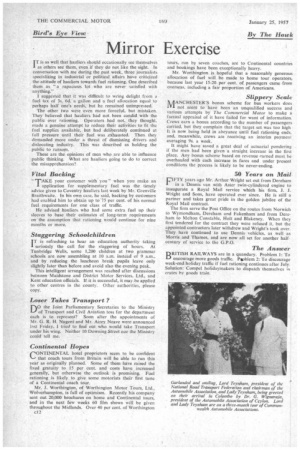Mirror Exercise
Page 50

If you've noticed an error in this article please click here to report it so we can fix it.
IT is as well that hauliers should occasionally see themselves I as others see them, even if they do not like the sight. In conversation with me during the past week, three journalists specialaing in industrial or political affairs have criticized the attitude of hauliers towards fuel rationing. One described them as a rapacious lot who are never satisfied with anything."
I suggested that it was difficult to wring delight from a fuel tax of 3s. 6d. a gallon and a fuel allocation equal to perhaps half one's needs, but he remained unimpressed.
The other two were even more forceful, but mistaken. They believed that hauliers had not been candid with the public over rationing. Operators had not, they thought. made a genuine attempt to reduce their activities to fit the fuel supplies available, but had deliberately continued at full pressure until their fuel was exhausted. Then they demanded more under a threat of dismissing drivers and dislocating industry. This was described as holding the public to ransom. These are the opinions of men who are able to influence public thinking. What are hauliers going to do to correct the misapprehension?
Vital Backing
" TAKEyour customer with you" when you make an application for supplementary fuel was the timely advice given to Coventry hauliers last week by Mr. Grenville Braithwaite. In his own case, he said, backing by customers had enabled him to obtain up to'75 per cent, of his normal fuel requirements for one class of traffic.
He advised hauliers who had some extra fuel up their sleeves to base their estimates of long-term requirements on the assumption that rationing would continue for nine months or more.
Staggering Schoolchildren
IT is refreshing to hear an education authority taking I seriously the call for the staggering of hours. At Tunbridge Wells, some 1,200 children at two grammar schools are now assembling at 10 a.m. instead of 9 a.m., and by reducing the luncheon break pupils leave only slightly later than before and avoid also the evening peak.
This intelligent arrangement was reached after discussions between Maidstone and District Motor Services. Ltd., and Kent education officials. If it is successful, it may be applied to other centres in the county. Other authorities, please copy.
Loser Takes Transport ?
D°the Joint Parliamentary Secretaries to the Ministry of Transport and Civil Aviation toss for the department each is to represent? Soon after the appointments of Mr. G. R. H. Nugent and Mr. Airey Neave were announced last Friday, I tried to find out who would take Transport under his wing. Neither 10 Downing Street nor the Ministry could tell me.
Continental Hopes
CONTINENTAL hotel proprietors seem to be confident that coach tours from Britain will be able to run this year as originally planned. Some of them have raised the fixed gratuity to 15 per cent. and costs have increased generally, but otherwise the outlook is promising. Fuel rationing is likely to give some motorists their first taste of a Continental coach tour.
Mr. J. Worthington, of Worthington Motor Tours, Ltd., Wolverhampton, is full of optimism. Recently his company sent out 20,000 brochures on home and Continental tours, and in the next few weeks 60 film shows will be given throughout the Midlands. Over 40 per cent_ of Worthington c I 2 tours, run by seven coaches, are to Continental countries and bookings have been exceptionally heavy. Mr. Worthington is hopeful that a reasonably generous allocation of fuel will be made to home tour operators, because last year 15-20 per cent, of passengers came from overseas, including a fair proportion of Americans.
Slippery Scale
MANCHESTER'S bonus scheme for bus workers does not seem to have been an unqualified success and various attempts by The Commercial Motor to make a factual appraisal of it have failed for want of information. Crews earn a bonus according to the number of passengers carried, but they complain that the target set was too high It is now being held in abeyance until fuel rationing ends. and, meanwhile, crews are receiving an interim paymern averaging 9s. a week.
It might have saved a great deal of actuarial pondering if the men had been given a straight increase in the first place. Any bonus scheme based on revenue earned must be overhauled with each increase in fares and under present conditions the process is likely to be never-ending.
50 Years on Mail F1FTY years ago Mr. Arthur Wright set out from Dereham in a Dennis van with Aster twin-cylindered engine to inaugurate a Royal Mail service which his firm, J. J. Wright and Sons, have operated ever since. He is still a partner and takes great pride in the golden jubilee of the Royal Mail contract.
The firm serve the Post Office on the routes from Norwich to Wymondham, Dereham and Fakenham and from Dereham to Melton Constable, Holt and Blakeney. When they first tendered for the contract they were refused it, but the appointed contractors later withdrew and Wright's took over. They have continued to use Dennis vehicles, as well as Morris and Thames, and are now all set for another half. century of service to the G.P.O.
The Answer
BRITISH RAILWAYS are in a quandary. Problem 1: To encourage more goods traffic. Pblem 2: To discourage week-end holiday traffic if fuel rationing continues after July, Solution: Compel holidaymakers to dispatch themselves ia crates by goods train.




























































































